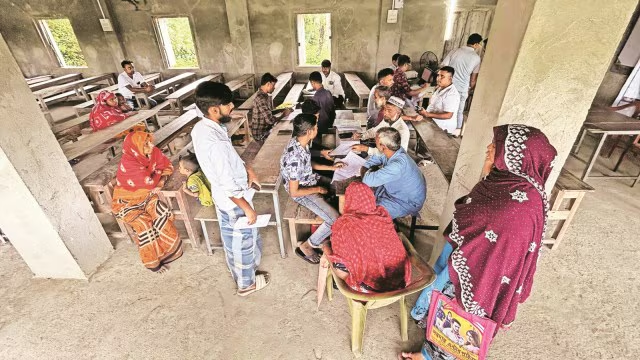“Fake Birth Capital of India?” – Bengal Village Shamed After 3,500 Forged Certificates Spark Passport Scam

Image via The Indian Express
14 September 2025, Sundarbans, West Bengal
The small village of Pathankhali, in the Sundarbans region of South 24 Parganas, West Bengal, is now at the centre of a scandal that has shocked the state and the nation. In June 2025, police arrested Gautam Sardar, a casual worker at the gram panchayat office, for allegedly running a racket that issued thousands of fake birth certificates.
The numbers are staggering. In just two years, more than 3,500 forged birth certificates were created in Pathankhali. This is extraordinary, considering the panchayat usually issues only about 150–200 certificates a year. Officials say many of these false documents were later used to apply for Indian passports. Some applicants may have been foreign nationals, including people from Bangladesh.
Today, Pathankhali is being called the “fake birth certificate capital of India.” For villagers, this is a heavy burden.
How the scam worked
Investigations reveal a shocking misuse of the official Janma-Mrityu Tathya portal, which records all births and deaths. Sardar, who worked casually in the panchayat office, allegedly gained access to the system by misusing the login credentials of the local gram pradhan, Suchitra Bhuiyan.
He reportedly changed the registered phone number in the system to his own, which allowed him to receive OTPs (one-time passwords) for approvals. This gave him the ability to generate certificates at will.
Evidence shows that many certificates were produced late at night — even at 1 or 2 am — when the office was shut. This alone should have raised suspicion, but somehow it went unnoticed for a long time.
Even stranger, some certificates listed addresses from faraway districts like Nadia and North 24 Parganas, which made no sense for a small Sundarbans village.
Arrest and police action
On 7 June 2025, police arrested Sardar and others connected to the scam. The case soon grew bigger. Officials believe that this racket was linked to a larger network that created fraudulent passports using fake documents.
The Enforcement Directorate (ED) also joined the probe. They are tracking how money changed hands. Early findings suggest that part of the earnings was sent across the border to Bangladesh through the hawala route.
Authorities have not yet revealed the exact number of passports issued using these false birth certificates. Some estimates say it could be around 400 passports.
Villagers speak of shame
For the people of Pathankhali, the scandal has left deep scars.
One villager, Dipali Munda, said bitterly:
“Relatives now laugh at us. They say our village is only known for fraud. One person’s greed has brought shame to thousands.”
Another gram panchayat member, Rafiqul Tarafdar, added:
“Wherever we go, people taunt us. They call Pathankhali a hub for fake certificates. It is humiliating.”
Even Sardar’s family feels the weight of public anger. His relatives say they face whispers and pointed fingers whenever they go to the market. For them, life has become unbearable.
Why this is serious
At first, one may think a birth certificate is only a small paper. But in truth, it is the foundation of identity. With a birth certificate, one can get an Aadhaar card, voter ID, ration card, PAN card, and most importantly, a passport.
If the first document is false, all the others become false too. A person who is not even a citizen can then legally appear as one. For national security, this is a dangerous loophole.
Forged passports can be used by criminals, illegal migrants, or even terror suspects. The fact that this racket may have involved foreign nationals makes the case more alarming.
Government response
The West Bengal government is now under pressure. Officials from the Health Department and Panchayat Department say they will bring in stricter checks.
Planned steps include:
- Multi-level verification before any birth certificate is approved online.
- Regular audits to check unusual spikes in numbers from one panchayat.
- Deletion of suspicious or already proven fake entries.
Experts say the case highlights how easy access to government portals can be misused. Proper training, stricter supervision, and tighter digital security are needed to prevent such scams in the future.
The bigger picture
Pathankhali may have been exposed, but questions remain about other villages. Was this an isolated case? Or are there more hidden hubs?
The fact that one casual worker could issue thousands of certificates unchecked suggests deeper systemic flaws. Either higher officials ignored red flags, or they were too careless to notice.
Some villagers believe powerful people higher up must have known. Others think Sardar was only a pawn in a much bigger network. Police are still investigating these angles.
Life after the scandal
For Pathankhali, the damage is not just in numbers but in reputation.
Parents worry about how this stigma will affect their children. Some fear that when their children apply for jobs or passports, they will face extra suspicion simply because of their address.
Young people say they are tired of being mocked. Farmers say outsiders look at them with doubt. Daily life now carries an invisible label of dishonor.
As one villager put it:
“We always lived quietly in our Sundarbans corner. Now, the whole of Bengal knows us, but for the worst reason.”
Conclusion
The Pathankhali scandal is not just a story of forged papers. It is about how a single loophole can threaten trust in the whole system.
The numbers — 3,500 fake certificates — are shocking. But beyond the numbers, it is the villagers’ shame, the national security risks, and the loss of faith in institutions that hurt the most.
As investigations continue, one thing is clear. For Pathankhali, being branded “India’s fake birth capital” is a wound that may take years to heal.